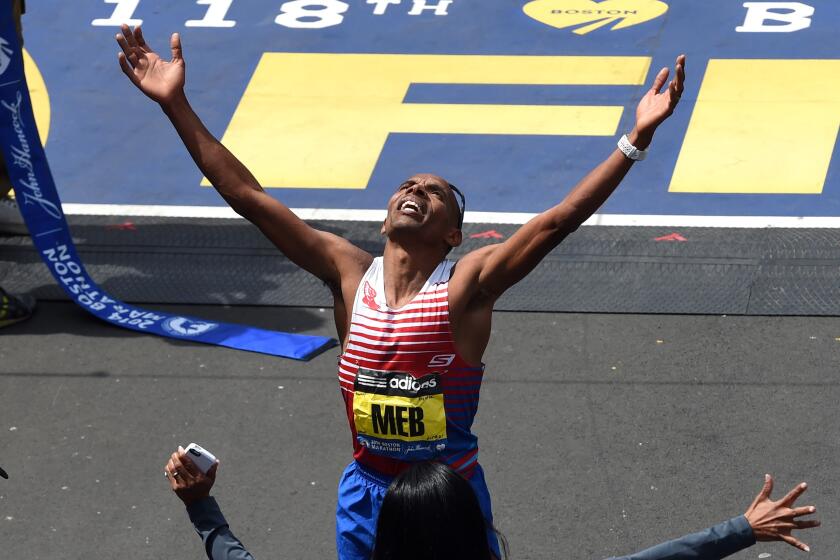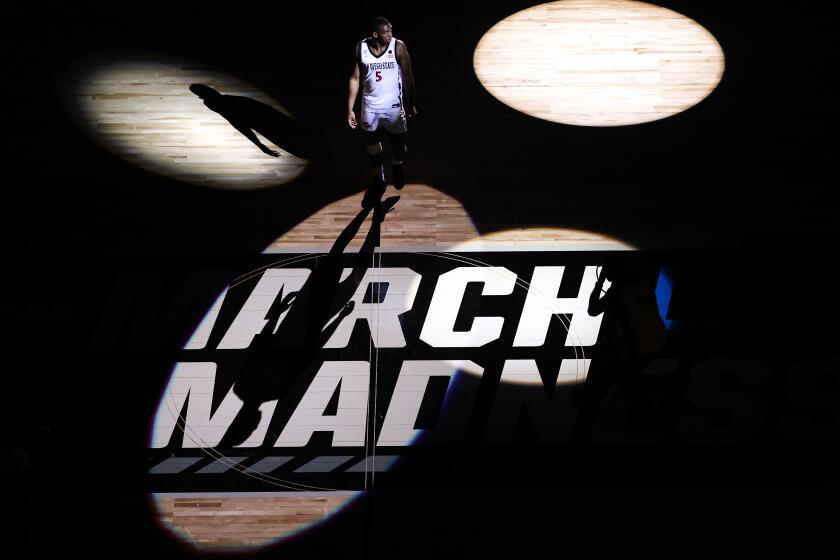Column: Never give up. From Marine to MMA champ, SD’s Liz Carmouche tells her story

San Diegan who now lives outside Ramona reaches summit at 38
As the walls of financial reality closed in, Liz Carmouche began selling things. Her surfboard. Her skateboard. Her snowboard. Art pieces.
The longtime Marine, trained at Camp Pendleton, had served three tours in Iraq while surviving multiple run-ins with improvised explosive devices. Transitioning to civilian life created anxiety and dread of a different and wholly unsettling kind.
“I had absolutely no success finding a job,” Carmouche said Wednesday, sitting inside The Arena combat-sports training gym on Sports Arena Boulevard. “I didn’t know how to word my resume. I knew how to be a Marine.”
Carmouche rewinds through the penny-pinching, the dead ends, the abject frustration of trying to simply make everyday life work in San Diego. Global hot spots, she could handle. Pockets filled with little more than lint? The strain was unrelenting.
That’s part of the reason, a dozen years later, that winning Bellator MMA’s flyweight world championship April 22 in Honolulu against unbeaten Juliana Velasquez as military personnel watched was satisfying beyond words.
What started as a flailing search for enough money to pay for gas and gym fees led to a title at age 38. Four times before, she fought for a belt. Four times before, she lost.
Why had she stayed with it? Quitting is for, well, quitters.
“Having the heart to overcome adversity, you have to find that inside yourself,” Carmouche said.
Those kinds of words seem frame-perfect for building and shaping confidence. They sound great coming from the Tony Robbins-types. Living it while reaching for a toilet brush, though, is another thing entirely.
When the military run ended, Carmouche showed up at a job-training center at 4 a.m. in hopes of landing anything that paid. One-day gigs included cleaning toilets, picking up trash and sign-flipping on street corners.
“You have to have a certificate to be a sign-flipper, believe it or not,” she said. “Maybe there’s training so you don’t hit someone with it? I don’t know. But that costs money, which I didn’t have, which was the point of me being there.”
A breaking point loomed. A conversation with one of her roommates in a Hillcrest apartment illustrated how much the stress had chipped away at her admirable resolve.
“I said, ‘I think I made a big mistake. I need to go back to the Marines,’ ” Carmouche said. “My roommate locked the door and said, ‘Hey, that MMA gym you’ve been talking about going to is down the street. You’re not allowed back in until you go.’ I said, ‘Are you kidding me?’
“She locked me out. So I went.”
Why not unlock the door herself?
“We all shared one key,” said Carmouche, with a laugh. ”We didn’t want to spend $7 to get a new key made.”
Carmouche lacked the money for the sign-up fee and monthly gym charges, but people there vowed she would find a way. She did. And now she’s a world champion.
That made the hand-raising after stopping Velasquez with a fourth-round TKO such an unforgettable moment. All of that money-related stress. Losing seven of the first 20 fights. A 12-year road.
The first thought?
“It was, oh my God, it finally happened,” Carmouche said.
The fight has had the word “controversial” attached to it because some feel Velasquez, a Brazilian with a 12-0 record coming in, was not afforded enough time to recover from a flurry of elbows from Carmouche.
The San Diegan, who now lives with her wife and 6-year-old son outside of Ramona, pinned the champion along the fence and proceeded to secure her dream one blow upon another.
Velasquez’s team protested the stoppage.
“I was just going to rain down elbows and make sure I ended that round with my hand in the air,” she said. “I was surprised when I heard ‘controversial.’ When I was on top of her, the position I progressed to, I’ve done plenty of times and nobody’s ever escaped. Every single training partner I’ve put in that position, nobody has escaped.
“It’s commonly known when you get to that position, it’s fight over. The first few elbows I threw, her eyes tolled in the back of her head, she stopped moving. There were 12 unanswered elbows. The ref made the right call. There’s no controversy there.”
If Carmouche sounds slightly irked about the situation, it’s because she’s not into excuses.
Starting with herself.
“I just feel like it’s bad sportsmanship,” Carmouche said. “There have been plenty of fights where I had the opponent come up to me and say, ‘I don’t know why they gave that to me. You clearly won the fight.’ I’ve had the organization say the same thing. I’ve had referees say the same thing.
“I didn’t scream backstage, kick chairs and have a temper tantrum. I just accepted it and understood that I made a mistake by allowing that opportunity and do something different in the future.
“To me, that’s what a champion does. You don’t have a hissy fit and act like a child. You accept what happened and change it next time.”
There be no surer sign of respect Carmouche has built in the sport, the challenges she’s stiff-armed and summiting the mountain at 38 than a call she received after collecting the belt.
“I got a call from Dana White,” Carmouche said of the man who runs the rival UFC where she previously competed. “That meant a lot. How many other people call to congratulate someone who’s not with that organization?”
Real and lasting financial rewards, Carmouche said, come with successfully defending a title. The next fight will be Bellator’s call, but likely would be at least four months or longer.
Might be OK to splurge on a spare key, even so.
Sign up for U-T Sports daily newsletter
The latest Padres, Chargers and Aztecs headlines along with the other top San Diego sports stories every morning.
You may occasionally receive promotional content from the San Diego Union-Tribune.












